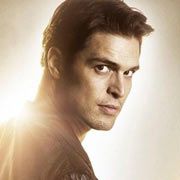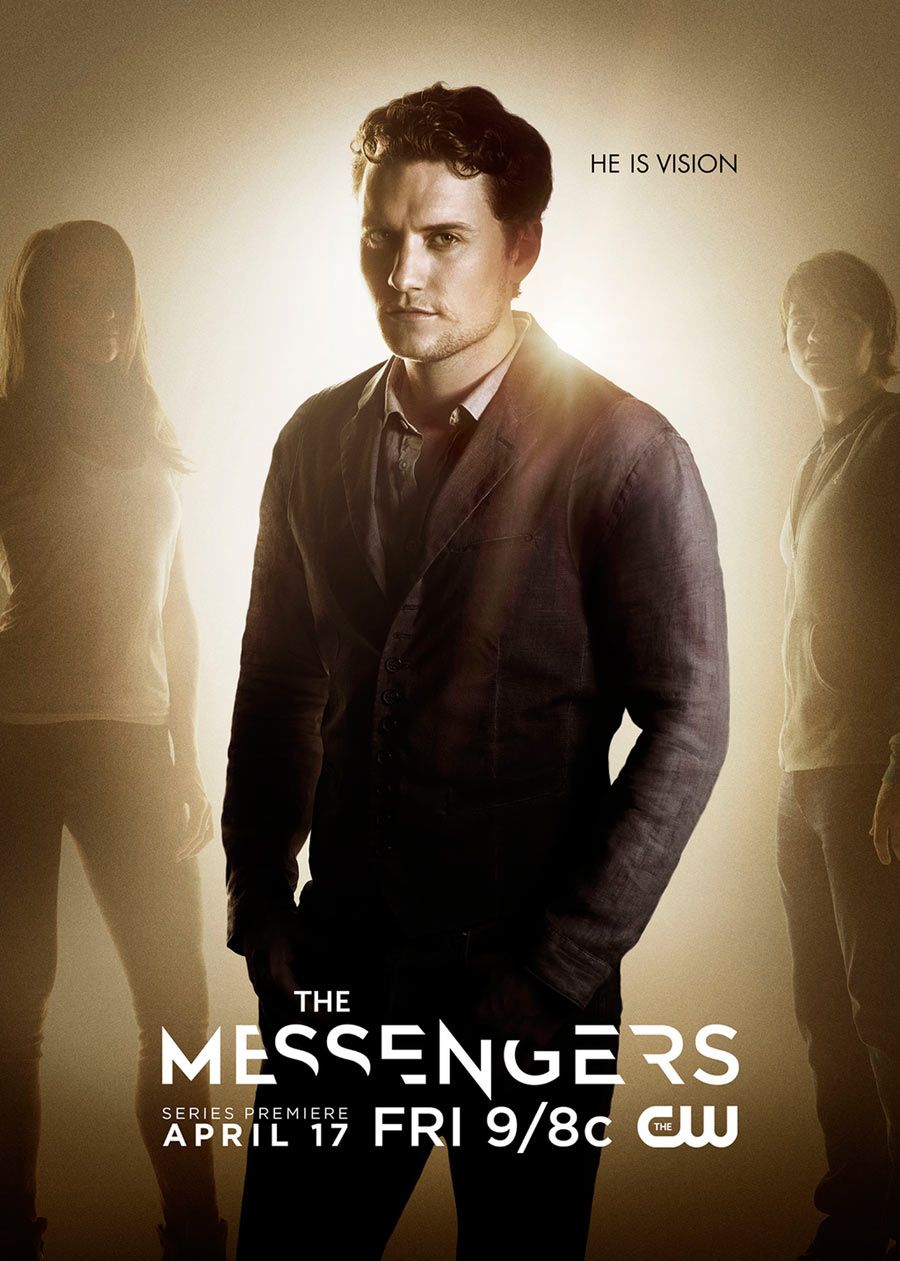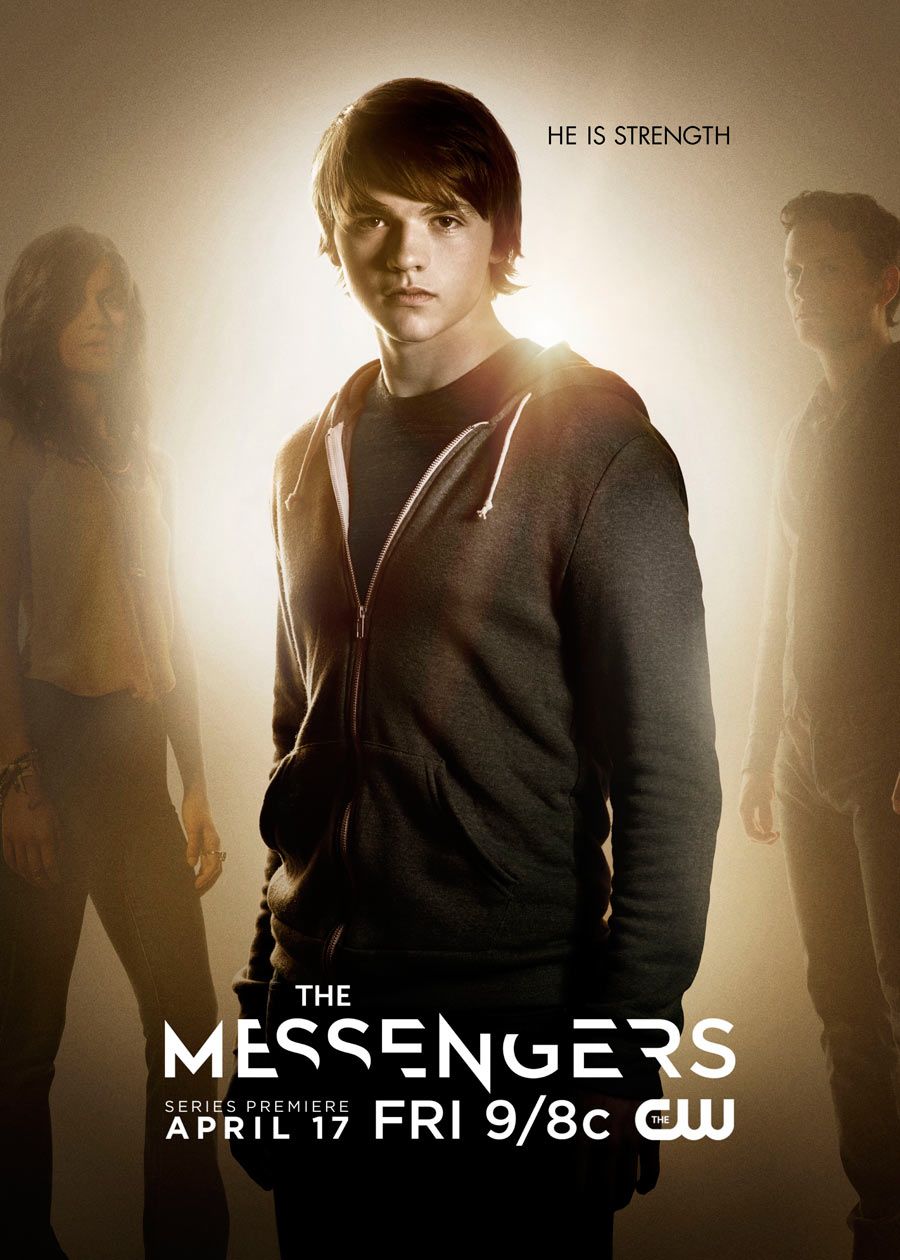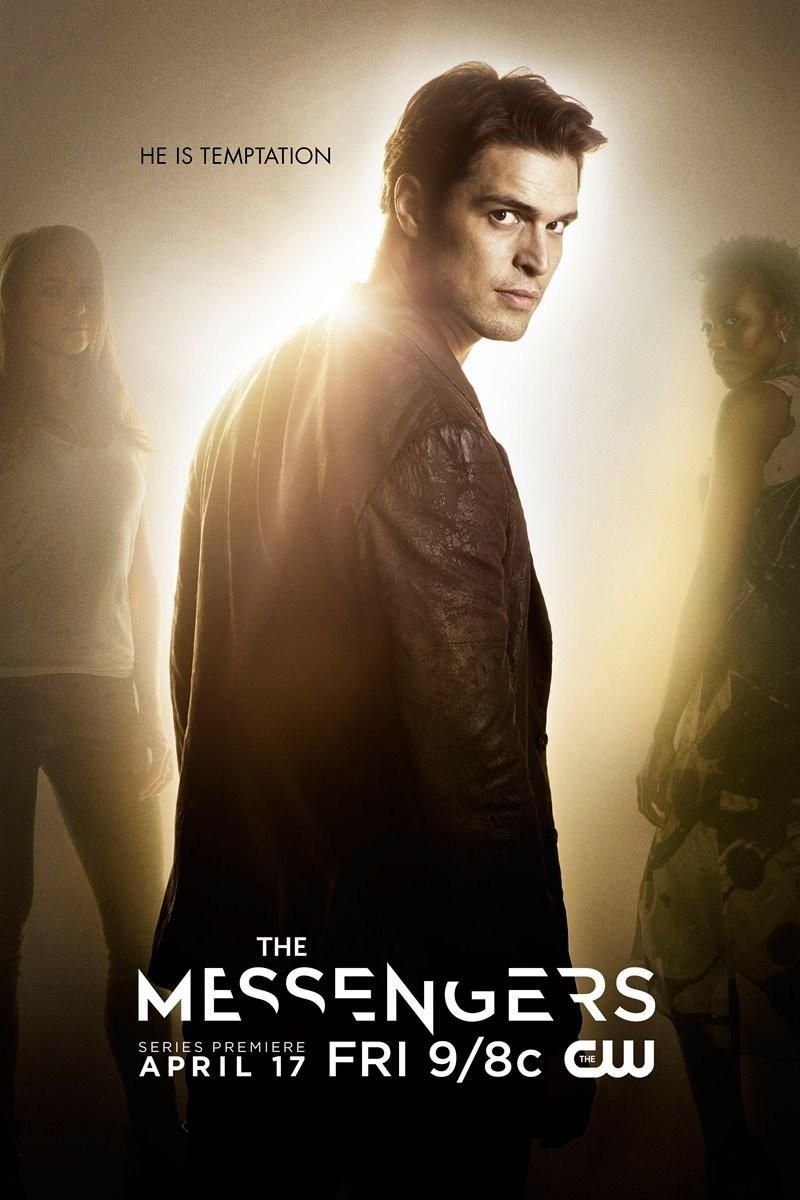With a lineup filled with genre shows like "Supernatural," “The Originals” and “The 100″ as well as comic-based series like “Arrow” and “The Flash,” The CW has become the go-to network for storytellers wishing to create high-concept series that bring to life elements of fantasy, science fiction and the supernatural. The CW's latest genre offering, “The Messengers,” plays for big stakes with the story of a group of disparate individuals who return from the dead with a new, unified purpose: preventing the impending apocalypse.
RELATED: The Messengers’ Cast Reveal The Fast-Paced Series’ Secrets
Ahead of its Friday debut, “The Messengers” was previewed at WonderCon 2015. Following the pilot's screening, cast members Jon Fletcher and Joel Courtney spoke with reporters about their characters, navigating the series' "heightened reality," and how, exactly, their newfound powers work.
On who their characters are and what they bring the new series:
Jon Fletcher: I play Joshua Silburn, Jr., who is a Texas televangelist. He is next in line to take over the church that his father has run for years, and when we meet him, he's about to go on and do his first real big sermon in front of the church. He admires his father. The church preaches prosperity much in the way [of televangelist] Joel Osteen. It's in that kind of an arena, and then, when this thing comes crashing to Earth and kills the five main characters, they reawaken and they've been given these gifts and have been challenged with, basically, saving the world from the impending Apocalypse. It's a very difficult transition, specifically for Joshua, who believes God is this one way and the God that he sees in the time when he's essentially dead is a very different God. So his world is kind of shattered very quickly.
Joel Courtney: I play Peter Moore. He's a regular teenager who's going through regular teenager problems. He's had a really rough past, being moved from foster home to foster home, a previous suicide attempt. So when the object crashes… the energy wave hits us and we die, but when that happens, I'm swimming in the pool. So people think that it's another suicide attempt and I'm trying to convince them that it's not. This is when Peter really finds out who he is and really finds his voice.
On the big changes their characters undergo in the pilot, and the continuing development they'll experience throughout the first season:
Fletcher: I think the pilot… puts them all on this path that is heading towards one another, but it's a very personal journey for them still, even though they end up working together as a team. Specifically for Joshua, it challenges his entire belief system, and that's a big struggle that he goes on. And then the things with his wife and more things will be revealed. It's a very dark path, let's just say, that he ends up taking.
Courtney: Yes, bombs are dropped on all the characters throughout the show. About our past, about what our future might hold. It's really interesting. In the pilot, you really get to know and love each of the characters individually, and throughout the show, you get more of that. You like the characters more and more -- the past that they've gone through, what they've had to endure -- and you really just come to love each of the characters.
Fletcher: Yeah, and the personal journeys, they continue to go on them through season one which keeps it very grounded. They're having to save the world from the Apocalypse and it's all very larger than life, but there are these very personal, full of heart stories that continue, that keep it very grounded and much more relatable, I would say, than the larger story that we're telling.
On the show's combination of sci-fi and fantasy and how these aspects help play up the characters' personal drama:
Fletcher: It's the real world as a "What if...?" What if we, today, are living in this world and this thing came to pass? And that's kind of, I feel, like how we all approached it and kind of how you keep it grounded, in that sense. It's very heightened, but you've got to find that way to keep it real, that makes it relatable, makes the audience feel that heart.
Courtney: Yeah, acting is playing a truth within whatever environment you're put in. So there's reality and then there's our show… Our characters are heightened, everything goes up. We're playing the truth in a ridiculous situation that we would think [would never happen], but that's what's happening for our characters. So what would you do?
On the characters' power manifestations and how the different abilities relate to their personalities:
Fletcher: I can say Joshua's the only one who immediately has changes. Everyone else doesn't quite understand what has happened -- and I don't think Joshua understands ,but it's more, like I said, he sees God when he's out. So there's this great shift for him. I would say yeah, moving through the season, it affects everybody in a different way. We're all given these gifts when we wake up, and everyone has their own individual gift that we will use to work together to achieve this mission… It's the personal stories that keep it grounded and, yeah, absolutely how we are responding to it individually.
Courtney: Peter's emotional life is rocked from his childhood because of the whole foster home to foster home situation, and at the end of the pilot when [Sam Littlefield's character Leland Schiller] starts to fight me, that's when my gift kicks in, which is strength, and I lose control. In later episodes, I find that my emotional state and control are from within, and that I can actually just control it and keep it under control. Which, I just said control like five times in one breath, I'm realizing now. [Laughs] What Peter's looking for is control, because he snapped, and he made a mistake that's going to be with him forever.
On whether their characters are able to willfully abuse their power:
Courtney: We find that it's more of a need, not want situation for our gift in later episodes. So if I wanted to hit someone, I wouldn't actually have it then, but if I need it, it's in the moment. It's more like adrenaline-based, so if you need it, it's there. You got it.
Diogo Morgado, who plays the antagonist only known as The Man, also spoke with the press about the significance of his character's name, how his actions will affect the show's group of potential saviors and what it is that drives his actions throughout the series' freshman season.
On previously playing Jesus in "The Bible" versus playing The Man now:
Diogo Morgado: Well, to be honest with you, obviously the American audience doesn't know me except for the role of playing Jesus, but I've been acting since I was 15. So this is basically what I do. Obviously, what is quite different is the fact that, for me, playing Jesus wasn't a job. It was way more of a personal experience of an amazing journey as a human being, as an actor, obviously. It's the ultimate challenge for an actor.
This is getting to work again, for me, but it's interesting because it's like the opposite, the extreme opposite. So what is interesting for me is we're telling the same story, kind of. Because it's raising the questions about morality, it's questions about good and evil. I normally say that what I like the most about the show is the fact that there's no right or wrong. There are only circumstances, and we are product of our own circumstances. Inside of us, there's a potential killer. There's a potential saint. It all depends on our own circumstances.
We could say that, "No, I would never kill someone." But if we're put in a situation that one of your loved ones would be a victim of something, suddenly you become someone different. Is that a bad thing? It makes you a bad person? Maybe not. Maybe not, but it's something primal. It's something that we all know and we all possess inside of us.
What I like about the show is the whole show is about options. It's about how our Messengers are going to act when they're at the crossroad. Are they going to be selfish in their choices? Are they going to think of the end of the world? So all of those questions are human and are valid. Being part of that storytelling is, for me, what is the main focus.
So I can be playing one of the Messengers, but it's interesting, especially after playing Jesus… I get surprised at my own perspective of evil in the world. The fact that The Man -- which is not random, the fact that he's not named "The Devil" is not random -- he's The Man because he doesn't possess any superpower. He doesn't have any special ability besides the human resource to manipulate a situation. So he can't use anything else than conversation, than human feelings, than being your best friend when you need him, and then [he has you in the palm of his hand]. You know what I mean?
So it's like, you can see him, regardless of the way he speaks and moves and whatever, you can see him as someone you know, someone you've seen, and you buy it. Because it's like I'm not levitating or [shooting] flames out of an apple. I don't know.
On being able to lead any of the Messengers astray:
The Man can't interfere. He's not allowed to do that. Free will is always there. So the only thing he does is sometimes present different roads and paths, but it's ultimately their choices. They have special abilities that they can use -- sometimes selfishly, sometimes not so selfishly -- but The Man can't use anything.
[He can use conversation] and human stuff… the Messengers are not closed on their own. They have families, they have relatives, they have friends. They have people that they know. For The Man, it's all a big chess game and he's using all different pieces and moves to manipulate the outcome of certain situations. What I'm saying is that he's not only going to play directly to them. He's going to be creating the circumstances that will [make them] choose.
On whether there's a larger reason why The Man is playing the game he's playing, and whether he is, in fact, the Devil:
That's exactly the question that almost got me fired. [Laughs] I'm so tempted to say it. But I can't. I can't. I want to, but I can't.
In my mind and in my perspective of the story, no. No. As I said, if we can say that he's The Devil, it's what we're using from the book of Revelation. So if there's a bad guy, it must be The Devil. You know what I mean? But the way he interacts and the way he moves and the way he -- his purpose is quite different.
On comparisons between "The Messengers" and The CW's other show about the impending apocalypse, "Supernatural":
I would say that this is more of a grounded show… It's more about human choices and what we do more than the supernatural side of it. Even their abilities, they're not using all the time. Like the strength and all these other things, it's not [super-heroics] -- which I love -- all the time. They must use it in specific situations, and sometimes they'll not even work, which I love about it.
So, all of our heroes are flawed. They have flaws. Even The Man has weaknesses. It's an ambiguous show, nothing is random. Sometimes when the audience will be a little bit lost, [they'll think], "Oh, yeah. They're lost. They don't know what's going on now." They do. They have a plan. They have a plan. This show is really well-written… it's clever.
On just how much viewers will learn about The Man over the first season:
A little. We can say that that's a hook throughout the show. What's his background? What happened before? That will be satisfied towards the end. So we will know stuff. Our curiosity will be satisfied towards the end. So I'm answering your question without answering. But do you know what I mean? It's not going to be like, "Oh, he's the bad guy," and just take it. No.
On how much of his character's motivation he was aware of at the beginning of filming as opposed to now:
Not much, but sometimes it's my option because… even when we get two episodes in a row or something like that, I hardly touch the second episode until I got the first one. Because I like to be in trouble. I like to feed out of what the scene is telling me to do. Sometimes it's even the opposite of what is written, but it's playing out to that and it's a subject of discussion among the cast and director.
What I believe, that's the essence of what we do. Create a moment that's unique in time, because we're all different. The wonderful thing about acting is that you shoot one thing that will never be repeated. You can try and recreate it, but it never will be repeated. So I like to be in trouble and not know what's going on down the line, even if I have to go back in my choices. So no, I don't know that much. There's a part of me that dies, wants to know, because I'm human, but I try -- my professional side says, "No, no, no. Don't go there. Don't eat from that apple."
“The Messengers” premieres April 17 onThe CW.




